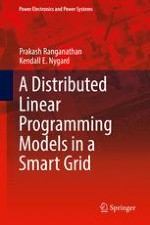2017 | OriginalPaper | Buchkapitel
9. Maximization of the Utility Function, Time-Dependent Energy Allocation, and Fuzzy-Logic Resource-Allocation Models
verfasst von : Prakash Ranganathan, Kendall E. Nygard
Erschienen in: Distributed Linear Programming Models in a Smart Grid
Aktivieren Sie unsere intelligente Suche, um passende Fachinhalte oder Patente zu finden.
Wählen Sie Textabschnitte aus um mit Künstlicher Intelligenz passenden Patente zu finden. powered by
Markieren Sie Textabschnitte, um KI-gestützt weitere passende Inhalte zu finden. powered by
